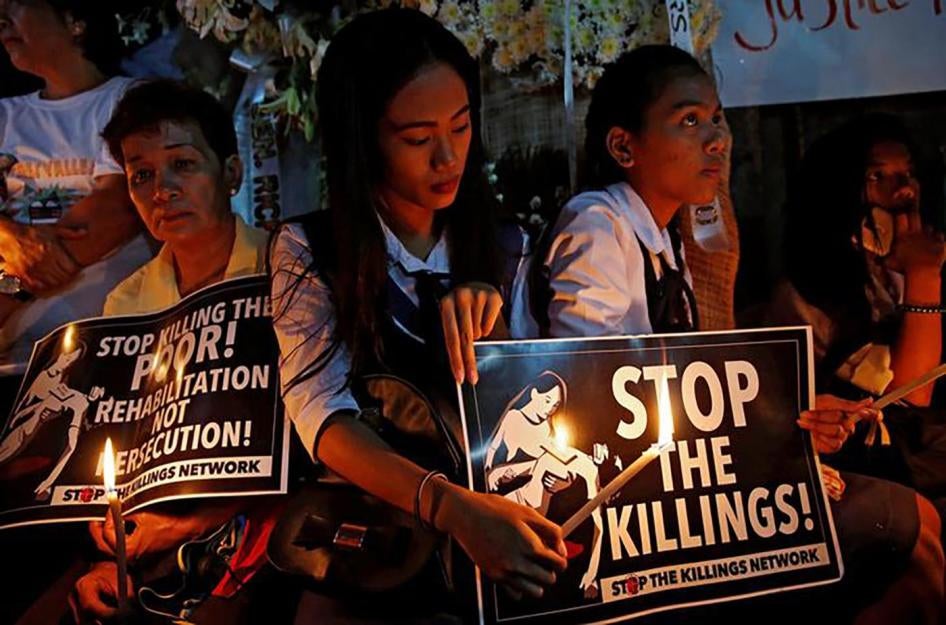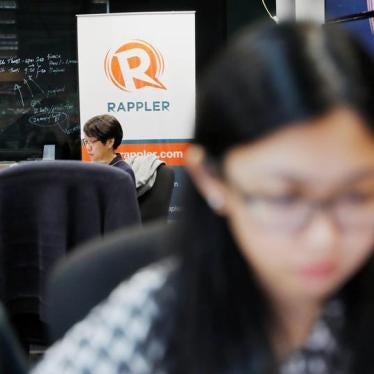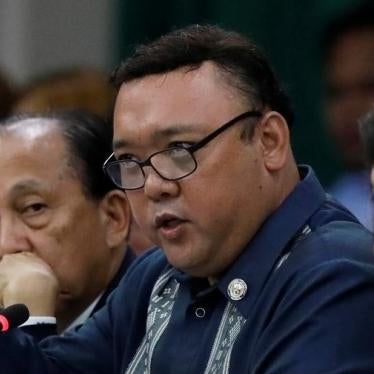(New York) – Philippine President Rodrigo Duterte’s murderous “drug war” entered its second year in 2017, resulting in the killing of more than 12,000 drug suspects, Human Rights Watch said today in its World Report 2018. Duterte has responded to increased criticism of his anti-drug campaign by impugning, harassing, and threatening critics of the government and human rights defenders.
Since the “drug war” began on June 30, 2016, Duterte and his officials have publicly reviled, humiliated and, in one instance, jailed human rights advocates. Senator Leila de Lima, the president’s chief critic, has been detained since February 2017 on politically motivated drug charges in apparent retaliation for leading a Senate inquiry into the drug war killings and, early on, opening an investigation of the Davao Death Squad in Davao City, where Duterte was mayor for more than 20 years.
“President Duterte has not only resisted calls to end his brutal ‘drug war,’ but has used populist rhetoric to disparage the brave activists who have been investigating and denouncing his cruel campaign,” said Phelim Kine, deputy Asia director. “Since Duterte will never undertake a serious investigation into the ‘war on drugs,’ it’s up to the United Nations to support an international investigation and bring the mass killings to a stop.”
In the 643-page World Report, its 28th edition, Human Rights Watch reviews human rights practices in more than 90 countries. In his introductory essay, Executive Director Kenneth Roth writes that political leaders willing to stand up for human rights principles showed that it is possible to limit authoritarian populist agendas. When combined with mobilized publics and effective multilateral actors, these leaders demonstrated that the rise of anti-rights governments is not inevitable.
More than 12,000 suspected drug users and dealers, mostly from poor families in urban centers across the country, are estimated to have died in the “drug war,” including an estimated 4,000 during operations led by the police and the remainder by “unidentified gunmen.”
In August, Duterte encouraged police attacks against human rights groups and advocates, instructing police to shoot them “if they are obstructing justice.” Duterte has publicly condemned the official Commission on Human Rights, even threatening to abolish the constitutionally mandated body. He also repeatedly subjected the UN special rapporteur on extrajudicial killings, Agnes Callamard, to profanity-laced ridicule for her repeated efforts to secure an official visit to the Philippines. Duterte’s spokesman, Harry Roque, has accused the UN of “bullying” the Philippines about extrajudicial killings.
On social media, pro-Duterte trolls and supporters – some of them officially working for the government – have threatened violence against human rights advocates, including Human Rights Watch staff and journalists who report critically on the “drug war.”
In October, Duterte responded to public outcry over the killings – particularly of children – by taking the Philippine National Police (PNP) out of the anti-drug operations. The killings declined but did not stop, and the president has said he would reinstate the police in the campaign. A Human Rights Watch investigation found that police and their agents have repeatedly carried out extrajudicial killings of drug suspects, and then falsely claimed self-defense. The police claim that several police officers implicated in these killings have been dismissed from service and are under investigation but not one has been brought to trial.
The killing of journalists remains a concern in the Philippines as well as reports of attacks on schools by government forces. Leftist activists, often accused of being communist New People’s Army rebels, are targeted by the military.
The country also has a fast-growing HIV epidemic in the Asia-Pacific region, fueled by the government’s poor response to the crisis. Students are bullied, harassed, and discriminated against because of their sexual orientation and gender identity. In Marawi City, a predominantly Muslim part of Mindanao island, months-long fighting between the military and ISIS-inspired local Islamist groups resulted in the deaths of more than 1,000 combatants and civilians and the displacement of 400,000 residents.









